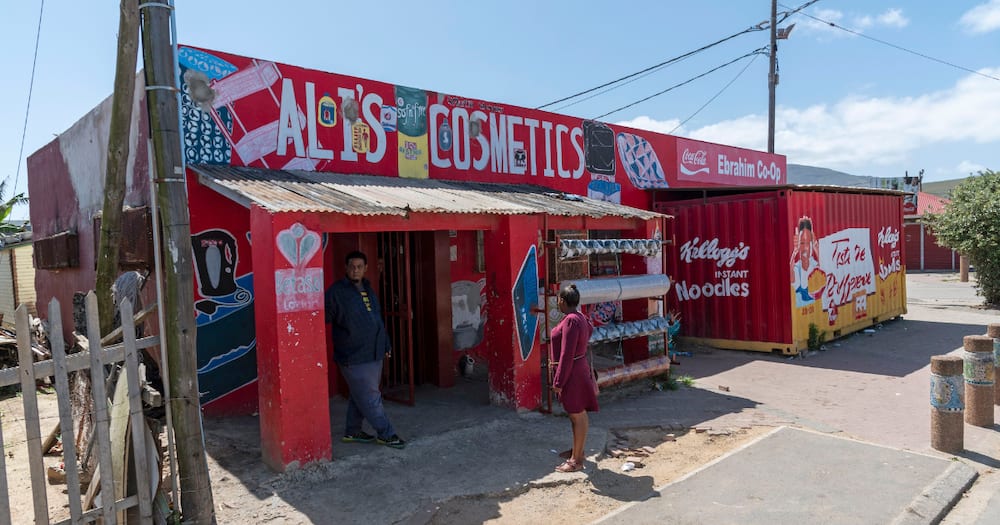How Township Businesses Are Essential for Job Creation in South Africa and Generation of R400 Billion
The township economy has shown significant growth in the past few years and it has been estimated that it generates around R400 billion annually. While people living in townships are normally low earners or living in poverty, they play a significant role in growing their economy and boosting local brands.
New feature: Check out news exactly for YOU ➡️ find “Recommended for you” block and enjoy!

Source: Getty Images
Approximately 11.5 million South African citizens are living in townships, which translates to a quarter of the South African population. While some townships are still developing and growing, there is no doubt that some people living in townships are not well off.
However, the township economy seems to be on the rise, this is despite the fact that unemployment in townships is still rife and the average household income is still very low.
According to the 2021 South African Township Marketing Report by RogerWilco, the township economy is worth approximately R400 billion and is crucial in creating jobs and socio-economic growth. Briefly News takes an in-depth look at how townships shape South Africa's socio-economic and influence in various sectors.
What makes the township economy unique?
There are a number of different factors that make township economies unique, according to Hassan Essop, a lecturer in the Department of Economics at Stellenbosch University.
PAY ATTENTION: Follow us on Instagram - get the most important news directly in your favourite app!
Speaking to Briefly News, Essop stated that a unique factor about township economies is their geographical area and that most businesses are conducted on an informal basis.
He added that businesses in the township have unique methods of advertising and production, adding that these methods are normally low-cost and very innovative. The most important thing about township economies is that they look out for the needs of poor people living in those communities.
"Another key difference is the fact that the township economy, in the main, caters for the poor, with product quantities, for instance, reflecting this reality," added Essop.
Another factor mentioned in the township marketing report is that townships have untapped potential in South Africa and they have a spending power of approximately R1 billion, despite the rampant unemployment and poverty.
How does South Africa's township's economy affect job creation?
Local businesses in the township play a crucial role in creating jobs and generating income. Kasi businesses such as spaza shops, hair salons and shisa nyamas contribute 5.2% to South Africa's GDP, according to RogerWilco.
These businesses also employ approximately 2.6 million people. While this might be an amazing feat, it is important to note that 77.1% of the people who formed part of the survey indicated that they were unemployed. 15.2% of people indicated that they had jobs and 7.7%% stated that they were self-employed.
Essop believes that there are approximately 800 000 informal businesses in South South Africa, which he explains indicates the sheer size of the township economy.
He further explained that the potential that lies within the township economy could make doing business in townships more attractive to the private sector and this could mean more jobs for community members.
"Private sector firms are driven by money, and they will be moving increasingly to townships to improve their profits, given the large number of opportunities there,
"With the right intervention, townships can develop what is the most important aspect of any economy, and that is small and medium businesses. The latter, in turn, creates the most sustainable jobs, not large firms or the government," explained Essop.
How do people in the township boost local fashion brands?
According to a report issued by Survey24 called the South African Township CX report, local fashion brands in the country have enjoyed a lot of success in recent years, and some, such as the MaXhosa brand, have even gone international.
Even brands such as Bathu Sneakers and Drip Footwear that started in townships before going national are also growing and enjoying a lot of success, especially in townships. Survey24 found that 74% of the survey respondents indicated that they would rather buy local brands over international brands when it comes to clothing.
They also indicated that they would rather use their store accounts to buy local brands over more popular international ones.
University of Johannesburg fashion lecturer Tinyiko Baloyi explained that the popularity of local brands stems from the fact more people see these brands as a stamp of approval and a symbol of status.
29% of the survey respondents indicated that they would buy more of the Bathu brand given the opportunity, while 25% stated that they would buy Drip using their store accounts. TSHEPO Jeans and Rich Mnisi came in third and fourth place, respectively, as brands that people would buy on their store accounts.
When reflecting on local businesses and brands, Essop explained:
"Townships are hubs of creativity, sometimes driven by sheer necessity. To mangle a quote by Schumpeter: Creativity destroys and provides the next phase of growth."
How are malls in townships impacting spaza shops?
The RogerWilco report indicated that shopping malls are a growing feature in townships in recent years.
In the past, residents would normally buy their grocery top-ups at nearby spaza shops since malls and supermarkets used to be a distance away. Despite this, several spaza shops are still operating in townships.
"Spaza shops account for around 54% of all micro-enterprises in townships, with around 100,000 shops countrywide," read the report.
Bulelani Balabala, Township Entrepreneurs Alliance founder, argued that malls are killing spaza shops and their implementation should have been regulated to protect small business owners.
“This would have protected the market and let the malls know that in order to participate within this market, they should have opened up spaces within the malls for these outlets to operate, thus fostering growth," explained Balabala.
Essop also noted that there may be tensions in the townships because foreign nationals own a few businesses there, such as spaza shops. He further explained that people in the townships need to foster relations with foreign nationals and resolve their differences beyond the business aspect.
Creative township entrepreneur wows SA with smart hustle
Briefly News previously reported that Sizwe is based in Kagiso in the West Rand and he is a serious influence on the youth for his dedication to his hustle. Sizwe operates his business in Mogale City.
Also known as 'chicken dust', the guy doesn't only sell chicken, but also sells braaied wors. His creative ways towards his hustle have attracted Briefly News’ attention and we also look at the social media comments.
Many people are very encouraging to the young man, who is creative and driven. According to @KasiEconomy, Sizwe is a perfect example of a business-minded person.
New feature: check out news exactly for YOU ➡️ find "Recommended for you" block and enjoy!
Source: Briefly News






